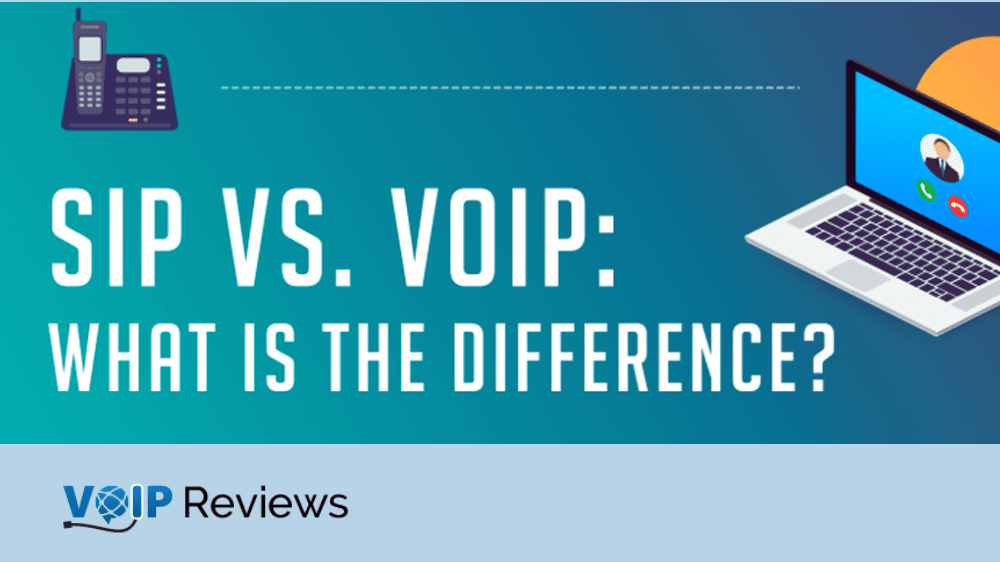SIP vs. VoIP – What’s the difference?

The enterprise world is probably full of acronyms and terms that can confuse anyone. One such difference is VoIP and SIP, which many people misunderstand. Let’s learn the difference between VoIP and SIP.
Although VoIP and SIP look similar technically, they are very different. You cannot use one as a substitute for the other. SIP is helpful for organizations, homes, and consumers, while VoIP is primarily concerned with voice calls supported over the Internet. VoIP phone systems and SIP phone services serve different business purposes.
Understanding SIP vs. VoIP: What is SIP?
Session Initiation Protocol (SIP) can be used to control, set up, and refer multimedia sessions that include:
- Multiple callers
- Video
- Audio
- Instant message
- A combination of variables
SIP phone services initiate calls between multiple parties through a SIP proxy server. After the initial parameters are created, the transmission of voice data and the actual calls between the endpoints begin. SIP phone service is just one of many protocols used to implement VoIP.
Why are SIP phone services essential to your business?
Modern digital services use many protocols, including HTTP, TCP, and SIP. Multiple vendors must agree to optimize the protocol before deploying it to applications/devices. SIP dictates how messages are sent between endpoints to set up or manage multimedia sessions, but other protocols take care of the actual video or audio. You can only use SIP-compliant devices to see if they work with your system. You don’t have to worry about integration or compatibility issues.
What is VoIP?
Voice over Internet Protocol (VoIP) defines a technology to allow voice signals to be shared over the Internet. If the voice call travels over the Internet, you can call it VoIP. Only a few VoIP systems use SIP to meet industry standards.
The connection between VoIP phone system and SIP phone services
The following example can better explain it: Email is usually implemented through SMTP (Simple Mail Transfer Protocol). End users can send emails without obstacles by making the services compliant with standard protocols. Using SIP to deploy a VoIP network makes it easier for organizations to work on the same devices.
SIP Functionalities
SIP offers many valuable features that can be used even in complex PBX systems.
User capacity
Endpoints use SIP to detect the type of audio codec, file, or video used on a call.
Session setup
SIP prompts the phone to start ‘ringing’ and manages the initial communication between the parties.
Session Management
SIP performs other functions, including video conferencing, ending calls, or connecting other callers.
User Registration
SIP endpoints are registered with proxy servers that maintain a list of endpoint locations. So, when a particular phone initiates a call, a request is sent to the proxy server to connect to another endpoint and establish a session.
User availability
The SIP determines whether the parties are ready to answer, participate, or respond to the session.
Different types of VoIP deployments
Before choosing the exemplary Service for your business needs, evaluating the different types of VoIP deployments is essential. Here are some things you can remember:
SIP Trunking
It is the process of providing telephone service to organizations with IP PBX to replace PRI lines between traditional telephone companies and organizations. SIP channels can be used as a bridge between PSTN and VoIP. Note that a SIP trunk is a virtual connection (not a physical line) to companies and Internet Telephony Service Providers (ITSP).
- The seller may be held responsible for the connection or dial tone
- You can manage your PBX with complete control.
- Your team can decide which features you want to work on or enable.
- You are solely responsible for the confidentiality and security of the data.
- You can control/determine when or how to upgrade software/hardware.
Although SIP delivery is more expensive, it can save your business a lot of money in the long run. You can expect a better investment from SIP.
Hosted VoIP service
The vendor usually takes care of PBX or related components. Customers are provided with a simple management panel to set up the PBX configuration, and telephone services are delivered over the Internet.
Why are hosted VoIP services so popular?
- Eliminates the hassle of repair or maintenance
- No system administration required
- No need to update from time to time
- No need to buy expensive hardware
- It’s easy to get started in no time with hosted VoIP services
- Your service provider may be responsible for ensuring that the service is available, secure, and maintained
Although cloud service can be expensive, it eliminates the need for maintenance or in-house support.
You can find a cloud VoIP vendor to meet your business needs, as numerous VoIP services are in the market. When you choose a VoIP phone system, you don’t need a team to take care of or manage the phone system. The vendor takes care of everything, as the original provider can get better support for troubleshooting. On SIP lines, you may need to hire a team to maintain the phone system.
If you’re still confused about the differences between VoIP and SIP, we can assist you in selecting the right one for your business. The “voipreviews.com” team is well-versed in answering your queries and finding the right phone system to meet your business needs for the continuous growth of your business. Call us now!
